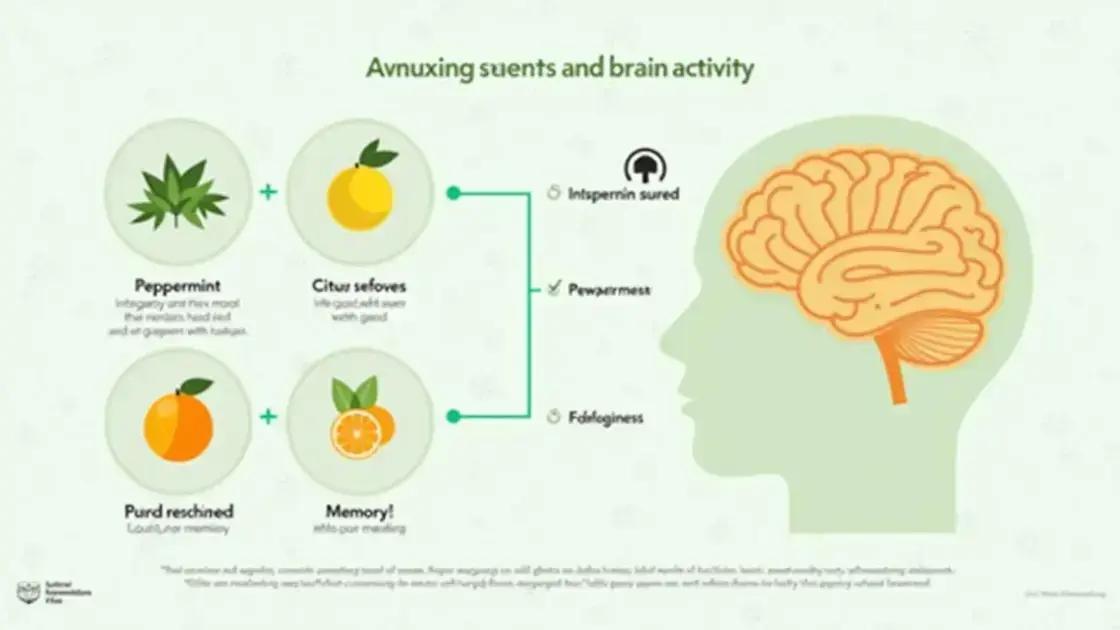The Smell Trick can significantly improve focus and mental clarity by utilizing specific scents like peppermint, rosemary, and citrus, which stimulate brain activity and enhance cognitive performance. Creating a scented workspace, using aromas during study sessions, and incorporating calming scents can help reduce stress and boost productivity effectively.
Can the Smell Trick improve focus and mental clarity? Many people seek effective methods to enhance their cognitive abilities, and interestingly, scents may hold the key. Research suggests that certain aromas have a remarkable impact on our brain’s functions, potentially boosting our concentration and clarity. In this article, we will delve into the concept of the Smell Trick, examine the science behind it, and share practical ways to utilize smells for improved focus and mental acuity.
Understanding the Smell Trick

The Smell Trick refers to the use of specific scents to influence our mental state and boost productivity. This technique taps into the power of aroma, which can create various emotional and cognitive responses. Different scents can evoke memories, enhance concentration, or relax the mind, making them beneficial tools for improving focus and mental clarity.
How Smell Affects the Brain
When we inhale a smell, the olfactory system sends signals directly to the brain, particularly to areas associated with memory and emotion. This is why smell can trigger vivid memories or feelings. Some scents can stimulate brain activity, leading to enhanced cognitive abilities and focus. For example, peppermint and citrus scents are often recognized for their energizing effects.
Types of Scents for Focus
Many people find that certain scents help increase their productivity. Here are some commonly used aromas:
- Peppermint: Known to invigorate the mind and increase alertness.
- Rosemary: Often linked to improved memory retention and cognitive performance.
- Citrus: Fresh scents like lemon and orange can uplift mood and energy levels.
- Lavender: Although it is more calming, it can create a focused mind by reducing anxiety.
By understanding how these scents interact with our brain, we can utilize them effectively to achieve better mental clarity.
Implementing the Smell Trick
Incorporating the Smell Trick into your routine is simple. You can use essential oils, scented candles, or even fresh herbs. When you need to concentrate, take a moment to inhale your chosen aroma deeply. This practice not only enhances your focus but also makes repetitive tasks more enjoyable.
Science Behind Scents and Focus

The science behind scents and focus is fascinating and reveals how our brains react to different aromas. Research indicates that certain smells can lead to improved cognitive performance. When we encounter a scent, it is processed by the olfactory bulb, which has direct connections to the brain areas responsible for memory, emotion, and cognitive functions.
How Aromas Affect Brain Activity
Studies have shown that inhaling particular scents can increase brain activity associated with attention and memory. For example, a study found that peppermint and rosemary scents boosted cognitive performance in tasks requiring focus. Participants who smelled these aromas performed better than those without scent exposure.
The Role of Neurotransmitters
Scents influence our body’s chemistry by triggering the release of neurotransmitters. For instance, citrus scents can elevate serotonin levels, a neurotransmitter that affects mood and well-being. Higher serotonin levels can lead to better concentration and mental clarity, making citrus scents particularly effective for studying or working.
Smell and Memory Connection
The connection between smell and memory is powerful. This association is why certain smells can evoke strong memories or feelings. This phenomenon can be exploited by using specific scents while studying or working. When these same scents are introduced during recall, it can enhance memory performance.
Conclusion on the Science
Understanding the science behind how scents affect focus helps in creating optimal environments for productivity. By carefully selecting scents that trigger positive brain responses, we can significantly improve our ability to concentrate and think clearly.
Practical Ways to Use Smell for Clarity

Using smell in everyday life can significantly enhance focus and mental clarity. Here are some practical ways to incorporate scents into your routine:
1. Create a Scented Work Environment
Set up your workspace with scents that promote concentration. Use essential oils or scented candles like peppermint, rosemary, or citrus. Place them on your desk or use a diffuser to spread the aroma throughout the room.
2. Smell and Study
If you are studying, consider using a particular scent like lemon or peppermint while you study. Then, inhale that same scent during your review sessions. This method can activate memory recall and support better retention.
3. Aromatherapy During Breaks
Take breaks during work and inhale calming scents like lavender to reduce stress. You can use essential oils, scented lotion, or even a relaxing herbal tea to ensure you smell the aroma while you unwind.
4. Inhale Scents Before Tasks
Before starting a challenging task, take a moment to breathe in a stimulating scent. Hold a bottle of essential oil to your nose or get fresh herbs. This technique can boost your focus and prepare your mind for the task ahead.
5. Use Scented Personal Items
Incorporate scents into personal items you frequently use, such as your stationery or bookmarks. A little scent on these objects can create a comforting atmosphere and assist in keeping your mind alert while you work or read.
Personal Experiences and Testimonials

Many people have shared their experiences with using scents to enhance focus and mental clarity. Here are some personal stories showcasing the effectiveness of the smell trick:
1. Sarah’s Study Sessions
Sarah, a college student, discovered that using peppermint oil helped her concentrate while studying for exams. She would diffuse the oil in her room during late-night study sessions. Sarah noticed that the smell kept her alert and helped her remember more information during her tests.
2. Mark’s Work Performance
Mark, a freelance graphic designer, reported feeling more productive when he incorporated citrus scents into his workspace. He set up a small diffuser with lemon essential oil. Mark said the fresh scent revitalized him and made him more creative and focused during long design projects.
3. Lisa’s Stress Reduction
Lisa found that lavender essential oil significantly reduced her stress levels at work. She applied a small amount of lavender oil to her wrists before meetings. By using this calming scent, Lisa felt more relaxed and able to think clearly, improving her performance during presentations.
4. Tom’s Memory Recall
Tom, a high school teacher, encouraged his students to use specific scents while studying. They would use rosemary during their study sessions and then smell it again during tests. Tom noticed improved performance among his students who used this technique, attributing it to the scent’s connection to memory recall.
These personal testimonials exemplify how powerful scents can be in enhancing mental clarity and focus, showing that the smell trick is a practical tool for anyone looking to improve their cognitive performance.
Embrace the Power of Scents for Better Focus
Incorporating the Smell Trick into your daily routine can lead to significant improvements in focus and mental clarity. By understanding the science behind scents and their effects on our cognitive functions, we can utilize them effectively to enhance our productivity.
Practical methods such as creating a scented workspace, using specific aromas during study sessions, and sharing personal experiences illustrate how powerful scents can be in improving mental performance.
As many have discovered, the right scents can not only help reduce stress but can also trigger memories and boost concentration. By embracing these aromatic tools, you can unlock your full cognitive potential and transform the way you work and learn.
FAQ – Frequently Asked Questions about the Smell Trick for Focus and Mental Clarity
How can scents improve my focus?
Certain scents, like peppermint and citrus, can stimulate brain activity, leading to enhanced concentration and productivity.
What are some effective scents for studying?
Popular scents for studying include peppermint, rosemary, and lemon, as they are known to boost alertness and memory.
How can I incorporate smells into my workspace?
You can use essential oil diffusers, scented candles, or fresh herbs to create a stimulating work environment with pleasant aromas.
Can scents help reduce stress?
Yes, calming scents like lavender can help reduce anxiety, promoting a clearer mind for better focus.
Are there any scientific studies supporting the use of scents for focus?
Yes, research has shown that certain aromas can enhance cognitive performance and improve memory recall during tasks.
How long does the effect of a scent last?
The duration can vary, but regularly exposing yourself to a specific scent while working or studying can create a lasting positive association.













